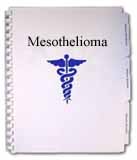|
Mesothelioma and Lung Cancer News - Return to Menu
Agilent Technologies' New Genome Analysis Technology Set to Accelerate Australia's Fight Against Mesothelioma
MELBOURNE, Australia--(BUSINESS WIRE)--April 15, 2005--Agilent Technologies Inc. (NYSE:A) today announced that its breakthrough Human Genome CGH Microarray technology will be used by researchers at Melbourne's Peter MacCallum Cancer Centre in a three-year study designed to better understand mesothelioma, a cancer found in the lining of the chest, the abdominal cavity and around the heart, usually caused by exposure to asbestos.
Due to its active mining and manufacturing of asbestos in the mid-1900s, Australia has the highest incidence of mesothelioma in the world. Rates of the disease have tripled in the past 20 years and are expected to peak about 2010. Diagnosis of this type of cancer is difficult, and patients are often not identified until the condition is quite advanced.
Agilent's new microarray techniques in comparative genomic hybridization (CGH) will allow researchers to rapidly and reliably identify genetic changes in tumorous cells. It is believed that specific genetic changes may accompany the onset and progression of the disease.
Dr. Andrew Holloway of the Peter MacCallum Cancer Centre said his team will work in conjunction with colleagues at The University of Western Australia, using Agilent's CGH microarray to provide a more thorough understanding of the genetic makeup of mesothelioma cells, which may ultimately lead to increased knowledge of the origins and development of this and other cancers.
"Agilent's CGH technology will allow us to study the entire genome in a manner that hasn't been possible in previous genomics research," said Holloway. "Upon completion, this project will produce the largest data set of its kind on mesothelioma in the world. We are very optimistic that it will give us a much clearer understanding and interpretation of this devastating disease."
"Agilent's new CGH microarray platform provides very high sensitivity, enabling researchers to detect small changes in chromosomes, including single copy deletions, which have previously been the most difficult to find," said Agilent Integrated Biology Solutions product manager David Tunks.
"We hope the outcome of this work will have a major effect on mesothelioma research," said Holloway. "The Australian economy will need $5 billion to fund the compensation, treatment and management of mesothelioma in the community, so this research is critical in working toward minimizing these costs, with the eventual hope of developing tools for earlier diagnosis and treatment."
About Agilent Technologies
Agilent Technologies Inc. (NYSE:A) is a global technology leader in communications, electronics, life sciences and chemical analysis. The company's 28,000 employees serve customers in more than 110 countries. Agilent had net revenue of $7.2 billion in fiscal year 2004. Information about Agilent is available on the Web at www.agilent.com.
NOTE TO EDITORS: Further technology, corporate citizenship and executive news is available on the Agilent news site at www.agilent.com/go/news.
Contacts
Weber Shandwick, for Agilent
Maree Brindley, +61 2 9994 4467 or 407 977 372
mbrindley@webershandwick.com
Tania di Palma, +61 2 9994 4466 or 414 920 299
tdipalma@webershandwick.com
Press appeal success grants 'an extra three months of life'
By HoldtheFrontPage staff
A press appeal to help extend the lives of people suffering from an illness that can kill within months has been a success.
The Evening Chronicle in Newcastle wanted a drug to be made available on the NHS to mesothelioma sufferers.
The illness is an industrial disease caused by exposure to asbestos fibres and results in fatal lung disease.
The paper published the pictures and stories of six men who have the disease, and who will die soon without the Tyneside-developed drug Alimta, available on the NHS in other parts of the country.
The Give us a Chance campaign, could bring them an extra three months of life, as well as a better quality of life in their final days, without having to find up to ?24,000 for private treatment.
The campaign has been hailed a success after the Northern Cancer Network revealed patients in the north-east would now be able to get their hands on the drug.
Chronicle readers sent in more than 2,000 petitions backing the call. The first treatments are to begin soon.
The newspaper? editorial on launch day said: "While Alimta is available on the National Health Service in Liverpool, London and Scotland, asbestos victims in the north-east have to pay ?24,000 for treatment.
"There is no cure but Alimta can extend life by up to three months and provides patients with a better quality of life in their final days.
"This allows them to put their affairs in order and ensure their families are secure.
"Given our region? industrial heritage there are many potential as well as current sufferers who would benefit from the drug."
|

































